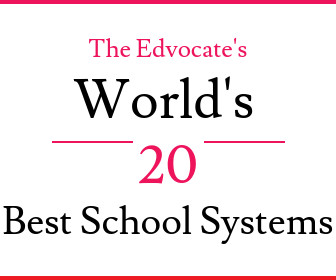Creating Real-World Connections and Fostering College and Career Readiness

By adopting a single platform that serves as a virtual staging area for all project-based learning, Columbus Signature Academy’s New Tech High School helps connect students to real-world learning while prepping them for success in college and the workforce.
By Joshua J. Giebel
When I ponder the traditional classroom setting, where instructors use textbooks, whiteboards, and lectures to teach math, I can only imagine how difficult it must be to make the critical real-world connections that students need to be able to fully engage with the subject matter. Simply telling students that geometry will someday become an important part of their lives isn’t enough. As learning facilitators, we have to illustrate those real-world connections, give pupils hands-on experience and examples, and then help them parlay their newfound knowledge into smart college and career choices.
At Columbus Signature Academy’s New Tech High School in Columbus, Indiana, we’ve been using project-based learning (PBL) since inception. When I was hired seven years ago, I was a recent college graduate whose teaching experience involved administering daily lectures and homework assignments in a traditional classroom setting. I’d heard of PBL through a college course and the concept interested me. I went through a rigorous, week-long training course on the nuts and bolts of PBL and then jumped in feet first.
When Will We Use This in Real Life?
The question math teachers hear most from students is, “When are we going to use this in real life?” Using PBL, I can provide the applications before that question pops into the student’s mind. As I was developing my own style of teaching math, this concept intrigued me. By creating projects and problems, I can show pupils how they’re going to “use it in real life” as they’re learning. This approach pushes them to develop a skill, come up with a solution, and/or create a workable method for solving the problem that I put in front of them. They can focus on building critical thinking and problem-solving skills in a way that the traditional classroom setting doesn’t support.
This year, my high-school geometry class tackled a project involving the furniture that they use in the classroom. In an effort to get more comfortable while seated, students tend to lean back too far in their chairs, which are built with small footpads. Because of the added weight and pressure pupils create when they lean back, these footpads break quite frequently.
To get to the bottom of this problem, we analyzed the design of the footpad and of the chair itself, which is made with an arc (where the footpad goes) that’s similar to a real, natural circle. Using the breakage problem as a focal point for the lesson, we talked about the arcs of circles, arcs on segments, sectors of circles, tangents, and all of the properties that go along with finding the center point of an object. Then, using an AutoCAD program and a 3D printer, students redesigned the chair footpads.
To take the project a step further, we had panelists from the chair manufacturer come into our class and assess the various alternatives that the students had designed. As it turns out, the company was aware of the problem and had already come up with a new design that was actually quite similar to some of our student projects. That was pretty exciting.
To manage the content associated with this and other problem-based assignments that my geometry and calculus classes work on, we use itslearning as our learning management system (LMS). For about two years now, students have used the centralized platform to conduct research, submit journal assignments, do their reflections, and create and store presentations, among other things. Using Prezi, Google Slides, or another type of presentation software, they work collaboratively and store all of their materials in the LMS.
For the chair project, for example, we shot a video of a chair breaking and then uploaded it into the LMS for students to watch and analyze. They were able to see what was happening during the breakage, where the stress was being created, and other key points. Then, using dynamic geometry software like GeoGebra and Geometer’s Sketchpad, they mapped out their arcs before putting them into the AutoCAD program.
Developing Tomorrow’s Workforce with PBL
What makes PBL so engaging is the fact that it’s student-centered—a key point that our LMS enables and supports. Put simply, students don’t have to come to me for every single thing. I can post information in the LMS and students know that they can always access it—whether they need it at the time we’re talking about it or three days later. This is a huge time-saver that allows pupils to manage themselves while also allowing me to be more productive during classroom time.
By encouraging students to identify real-world problems, develop solutions, and then present those solutions using 21st-century tools, PBL supports college and career readiness. This is important because today’s employers don’t want to hire people who are simply competent in academic areas; they want to hire people who can think critically and solve problems collaboratively.
Knowing this, our school intentionally and regularly builds in these skills to our instruction and assessment. In my view, college and career readiness is all about possessing 21st-century skills (e.g., the ability to communicate orally and in writing, collaboration, work ethic, mindset, etc.).
Project-based learning embeds these skills into each new undertaking so that, by the time students graduate from high school, they have had more experience working collaboratively, presenting to experts, and writing professional documents than most people have in their lifetimes. And by providing students with authentic, real-world problems, we engage students in the type of work they may encounter after high school. These experiences teach students about critical thinking and provide opportunities to persevere in solving problems.
Experimenting with PBL (or jumping right in) can seem daunting and difficult for any instructor. But it’s a worthwhile endeavor, and if you set realistic goals for how often you will do projects, come up with projects that you’re passionate about, and take a risk to change the way the class looks, it will pay off. The rewards are great and center on giving ownership back to students and then supporting those efforts/projects with an integrated LMS—a critical step in helping education move in the right direction as we go forward.
Joshua J. Giebel is a mathematics facilitator at Columbus Signature Academy’s New Tech High School in Columbus, Indiana.





